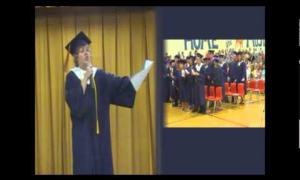News You Can Use: Would you really prefer the casket to the lectern?
November 30, 2008
From the archives of The Influential Executive, 12/2008
The very latest in the very long line of very suspect studies purporting to show that some people fear public speaking more than death comes from Australia. A survey by Newspoll found 23 percent of Australians fear public speaking more than death. The study was commissioned (of course) by an outfit that offers online public speaking training. In a report on the survey results, the Sydney Morning Herald dragged out the old Jerry Seinfeld quote, which the reporter said was about a “similar” study: “This means to the average person, if you go to a funeral, you’re better off in the casket than doing the eulogy.”
This supposed “study” goes back at least 30 years—and maybe longer. A Google search turns up articles citing it, willy-nilly, as a cultural fact.
“Fear of oration is ranked even above that of death …”
“Their number one fear was public speaking, and that the fear of death was number five.”
“Sociologists report that the fear of public speaking ranks even higher than the fear of death.”
“According to most studies, people’s number one fear is public speaking. Number two is death.”
“According to The Book of Lists, the fear of public speaking ranks number one in the minds of the majority of people. Far above the fear of death and disease …”
Elusive are:
1. The origin of this perpetual study.
2. A single report of anyone committing suicide to avoid a speaking engagement.
Coke to Americans: It’s not our fault you’re fat. In a bold address at the InterBev 2008 conference in Las Vegas Oct. 20, new Coca-Cola CEO Muhtar Kent urged industry leaders to reject claims they’re to blame for the U.S. obesity epidemic. “People need to understand that obesity is not about a beverage or a candy bar or a restaurant meal or a PlayStation game or about working longer hours,” Kent said, according to the Atlanta Journal- Constitution. “It’s a systematic lifestyle issue that we must address individually and collectively as a society.”
Music to our ears. In conjunction with his new memoir, Counselor: A Life at the Edge of History, former JFK speechwriter Ted Sorensen was interviewed by the Unitarian Universalists’ UU World magazine. Editor Jane Greer asked him how rhetoric contributes to political leadership.
“It’s words that enable a president of the U.S. to galvanize support in the country, to mobilize support in the Congress, and to attract support from our allies and others around the world,” Sorensen said. “Kennedy was respected and indeed revered in many countries of the world because you could tell from his words, his statements, his speeches, his positions, that he was a man with a good heart and compassion, and wanted peace. Yes, I think words matter a great deal.”
And finally, a cautionary (cock)tale. Robin Kay, president of the Fashion Design Council of Canada, made an unintended splash at the launch of the recent L’Oreal Fashion Week conference in Toronto. Overserved during a cocktail hour, she gave a drunken speech that ended in her being escorted off the stage. “Next time I’ll pace myself a little better,” she said. “I’m very embarrassed.”
The better quote came from Holt Renfrew fashion VP Barbara Atkin, who said, “This kind of bad behavior is the equivalent of wearing a bad accessory. The problem is no matter how beautiful your outfit is, everyone is looking at the bad accessory.”
Would you really prefer the casket to the lectern? … CEO calls on industry leaders to fight critics … and a cautionary tale about the importance of sobriety

